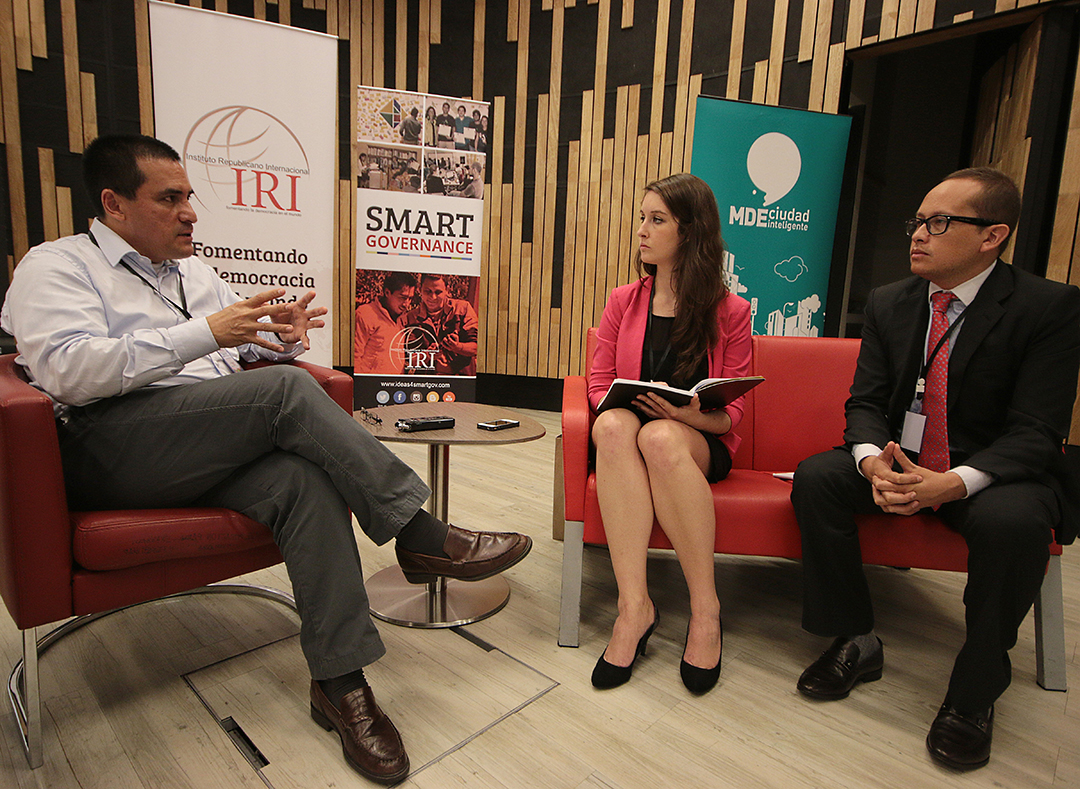
Medellín, Colombia is one of South America’s modern success stories. Known as a major drug-transit hub in the 1990s, it is now South America’s pre-eminent “Ciudad Inteligente,” or Intelligent City, having adopted a number of innovations that have improved service delivery to citizens, not the least of which is a digital online presence that makes doing business with the city’s government fast and easy.
So when IRI was looking for a venue to host its 2014 Smart Governance Forum and Workshop, Medellín appeared at the top of the list. From November 11-12, public and private sector representatives, academia, civil society organizations and other stakeholders in innovation, technology and governance from Colombia, El Salvador, Guatemala, Honduras, Mexico and Panama participated in the forum, co-sponsored by Medellín and by the Colombia-based regional satellite television network NTN-24, which has interviews, coverage and event highlights on its website.
In this tech-savvy setting, IRI’s forum showcased:
- Experiences, challenges and advances in the use of information and communications technology (ICT) for good governance;
- Hands-on workshops in which participants discussed specific challenges and relevant ICT solutions;
- Brief and insightful presentations by private sector representatives followed by one-on-one consultations with municipalities and civil society organizations; and
- Visits to Medellín’s Parque Explora science center and innovation incubator.
The forum also kicked off a series of Smart Governance initiatives in the six that participated in the forum, which will equip municipal leaders with skills and resources to promote citizen participation in local decision-making and facilitate greater engagement in policy development and implementation processes. Projects in the countries will include efforts such as software innovations to improve service delivery as well as the adoption of digital tools to enhance community outreach, establish citizen participation mechanisms and improve citizen feedback.
IRI also unveiled a web-based platform, www.ideas4smartgov.com, at the forum to share information on Smart Governance initiatives.
Launched by IRI in 2012, the Smart Governance initiative shows how technology can be used as a tool to narrow the divides that exist between citizens, local governments and different government agencies to make citizen participation open, fluid and constructive.
IRI’s Smart Governance initiative:
- Builds political commitment among mayors, councils and municipal staff to embrace technology-driven solutions to enhance democratic governance;
- Promotes citizen engagement and collective responsibility through social media and hackathons (youth-oriented digital programming contests) to address community needs such as improvements to public safety; and
- Connects municipalities with private sector technology experts who can help streamline municipal processes and improve service delivery.
IRI’s Smart Governance initiative first introduced digital tools in 2012, later adding public-private partnerships and crowd sourcing to enable a regional network where municipalities in Central America can share experiences and confer on best practices across national borders. This year, IRI is helping to strengthen municipal technical capacity and help communities build political support for innovation.
In El Salvador, municipal staff in the towns of Antiguo Cuscatlán and Santa Tecla created online portals where citizens can report crimes and request repairs to streetlights and other public infrastructure—building trust within their communities.
In Quetzaltenango, Guatemala, the municipality leaders worked with a firm that designs business process software to start an online tracking system to process thousands of citizen requests—improving service delivery.
In La Lima, Honduras, the municipality created an online radio station to broadcast activities, exchange citizens’ ideas and offer vocational training—engaging youth to build skills for the future.
These partners and others gathered in Medellín to learn, first hand, how that city transformed itself, in part, because of its growing commitment to innovation and citizen inclusion. After little more than 48 hours of getting to know the “how” of this transformation through briefings and tours of such public initiatives as Medellín Ciudad Inteligente and Ruta N, participants left energized and equipped to go home and start their next Smart Governance initiative.
Top